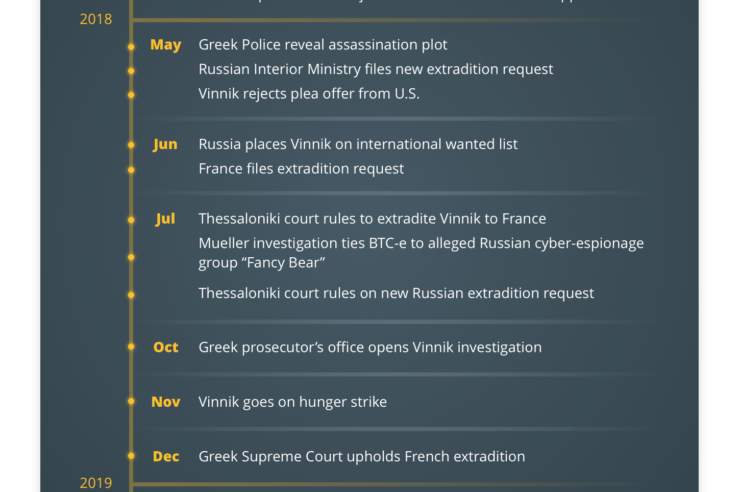On July 25, 2019, United States prosecutors filed a complaint against the defunct cryptocurrency exchange BTC-e and its alleged former operator, Alexander Vinnik. The indictment was filed nearly 24 months after Vinnik was arrested in Greece while on holiday with his family and has followed numerous extradition requests from the U.S., France and Russia that have seen Vinnik’s case appear to morph from an investigation into alleged money laundering to a tug-of-war over a strategic intelligence asset between the U.S. and Russia.
Vinnik’s arrest in July 2017
On July 26, 2017, the U.S. Department of Justice (DOJ) announced that Vinnik had been arrested two days prior in Greece for allegedly taking part in the operations of the shadowy cryptocurrency exchange BTC-e. The Russian citizen, who is now 39 years old, was described as the mastermind behind an international money-laundering scheme that had processed over $4 billion worth of capital flows, including approximately 300,000 Bitcoins (BTC) that had been stolen from now-defunct crypto exchange Mt.Gox.
According to BTC-e’s website, the exchange was located in Bulgaria, though it was subject to the laws of Cyprus, and was based in both Cyprus and the Seychelles. At the time of Vinnik’s arrest, BTC-e was described as “one of the world’s largest and most widely used digital currency exchanges.”
U.S. requests Vinnik’s extradition
The DOJ produced a 21-count indictment for the operation of an “unlicensed money service business, money laundering, and related crimes,” with Chief Don Fort of the U.S. Internal Revenue Service’s Criminal Investigation Division alleging that Vinnik also “stole identities, facilitated drug trafficking, and helped to launder criminal proceeds from syndicates around the world.”
According to the indictment, since the exchange’s inception in 2011, “Vinnik and others developed a customer base for BTC-e that was heavily reliant on criminals, including by not requiring users to validate their identity, obscuring and anonymizing transactions and source of funds, and by lacking any anti-money laundering processes.”
The Financial Crimes Enforcement Network (FinCEN) assessed a $110 million civil money penalty against BTC-e for the alleged willful violation of U.S. Anti-Money Laundering (AML) laws. FinCEN also assessed a $12 million fine against Vinnik for his role in the company’s operations. However, any prison sentence would be imposed only “after consideration of the U.S. Sentencing Guidelines and the federal statute governing the imposition of a sentence.”
In an interview with RT during September 2017, Vinnik stated that he did not consider himself to be guilty, rejecting accusations of being BTC-e’s operator. Instead, he claimed to have worked for the exchange for a short period of time. The interview contradicted previous assertions made by BTC-e that Vinnik “was never the head or the employee” of its service.
Russia requests Vinnik’s extradition
On Sept. 19, 2017, roughly two weeks from the date set for his court hearing in Thessaloniki, Greece to determine whether Vinnik would be extradited to the U.S., RT reported that Russia had sent a competing extradition request for the accused BTC-e operator. During the same day, Vinnik agreed to the Russian extradition request, with one of his lawyers, Timofey Musatov, stating:
“Alexander Vinnik was taken out of prison to the prosecutor of Thessaloniki, who introduced him to the demand for his extradition to the Russian Federation for the crimes committed there. Alexander Vinnik agreed with this request, replied that he voluntarily wants to be extradited to Russia.”
The Russian request would see Vinnik face charges for a separate fraud case worth roughly 667,000 Russian rubles (approximately $11,000). By contrast, if extradited to California and convicted, Vinnik would face up to 55 years in prison in the U.S.
On Oct. 2, 2017, Vinnik attended a hearing in Thessaloniki to consider the U.S. extradition request. On Oct. 4, the Greek court ruled in favor of Vinnik’s extradition to the U.S. On the same day, Vinnik’s lawyers moved to appeal the decision. Two days later, Russia’s Foreign Ministry issued a statement criticizing the ruling. It described the verdict as “unjust and a violation of international law,” asserting that legal precedent should indicate that the Russian extradition request should “take priority as Mr. Vinnik is a citizen of Russia.”
On Oct. 10, 2017, Russian Civic Chamber Deputy Secretary Sergey Ordzhonikidze asserted that the court’s decision violated the Russia-Greece legal assistance agreement. He stated, “If a Greek court rules that a Russian national is guilty, the issue must be solved between Russia and Greece.” The following day, the court in Thessaloniki also ruled in favor of the Russian extradition request.
On Dec. 13, 2017, the Greek Supreme Court rejected Vinnik’s appeal to be extradited to Russia, delegating the responsibility to Greece’s Ministry of Justice, Transparency and Human Rights. During January 2018, Vinnik’s lawyer, Musatov, indicated that Vinnik would appeal the ruling with the European Court of Human Rights.
Greek police reveal plot to assassinate Vinnik
During May 2018, Russian media reported that Greek police had uncovered a plan to kill Vinnik, with the plot purportedly tied to Russian criminals who did not want Vinnik to return home to Russia. According to an anonymous source:
“Greek law enforcement received intelligence on plans to prepare an assassination via poisoning with the help of criminals. […] It all began after Vinnik’s extradition to the United States was blocked. There [are] people who are extremely interested in him not coming to Russia. The assassination was ordered by some unknown person from Russia.”
In response to the plot, Vinnik was restricted from receiving any food, water or things from people unknown to him, and in addition to being provided enhanced security, he was prevented from coming into contact with other inmates. Greek police were reportedly made aware of the planned assassination at the start of 2018. However, the plot was not made public for several months to aid investigators.
During the same month, Russia opened a criminal inquiry into confessions penned by Vinnik, with sources allegedly telling Russian media outlet Sputnik that Vinnik wrote four letters to the Russian Interior Ministry between March and May 2018, in which he confessed to “crimes related to financial technologies” and that he was ready to give testimony and aid to Russia in related investigations. According to an anonymous source cited by the Russian media agency:
“Vinnik wrote several confession letters to Russian law enforcement agencies, pleading guilty to crimes related to financial technologies. The Russian Interior Ministry’s investigative department has opened a criminal probe into several unknowns.”
On May 15, 2018, Russian media reported that U.S. intelligence services had attempted to persuade Vinnik to accept a plea bargain that would see him receive a reduced prison sentence in exchange for admitting guilt and agreeing to extradition to the U.S. Vinnik reportedly rejected the offer.
Russia files new extradition request
One week later, the Russian Interior Ministry placed Vinnik on the international wanted list for embezzling 750 million Russian rubles (approximately $11.5 million). The new criminal case was launched on May 21, 2018, with the Russian Prosecutor General’s Office filing a new extradition request with Greece’s Ministry of Justice shortly thereafter.
On May 26, 2018, Vinnik’s lawyer, Musatov, tied the assassination plot to Vinnik’s knowledge of Russian criminal activity and Vinnik’s willingness to assist Russia in its investigations. He stated:
“Alexander has told ‘I know too much and a lot of people in Russia would be embarrassed if I am back home.’ It is likely that this attempted murder has been prepared taking into account the opportunity of his return to the country.”
France files extradition request for Vinnik
During June 2018, Vinnik’s case was further complicated by an extradition request filed by France. According to the Associated Press, the request sought to trial Vinnik for alleged crimes like money laundering, extortion, cybercrime and money laundering and allegedly defrauding French citizens between 2016 and 2018.
Another one of Vinnik’s lawyers, Ilias Spyrliadis, emphasized that the “legal issue that will require our attention is which [extradition request] will have priority, as they are based on two international arrest warrants and one European arrest warrant.” While the Greece’s Ministry of Justice would have the final say regarding the U.S. and Russian extradition requests, Greece’s Supreme Court would have final jurisdiction over the French request due to it being a European warrant.
During the first week of July 2018, Musatov claimed that the Thessaloniki court had attempted to determine whether Vinnik would be extradited behind closed doors. Musatov told Russian media that the court was attempting to extradite Vinnik through an expedited procedure. On July 13, 2018, the Thessaloniki court ruled in favor of the French request to take custody of the accused BTC-e operator. Vinnik immediately appealed the ruling, which would be heard by Greece’s Supreme Court later in the year.
Mueller investigation ties BTC-e to Russian hackers
During July 2018, the stakes surrounding Vinnik’s case appeared to escalate, with the DOJ special counsel investigating alleged Russian meddling during the 2016 U.S. presidential election, Robert Mueller, alleging that Russian targeting of the Democratic National Committee had funded its operation using capital that had flowed through BTC-e.
On July 24, blockchain analytics firm Elliptic published a report asserting that funds had flowed through BTC-e via “Fancy Bear,” a cyber-espionage group reportedly associated with top Russian intelligence agency, the Main Directorate of the General Staff of the Armed Forces of the Russian Federation (GRU). Elliptic’s chief data officer, Tom Robinson, stated:
“There was a strong link between much of the funds allegedly used by the Fancy Bear group and BTC-e. What I can’t say for certain is whether Fancy Bear obtained them directly from BTC-e, or whether there was an intermediary.”
The link between Fancy Bear and BTC-e was made public during 2017, with Elliptic identifying that Fancy Wallet controlled a wallet containing around $100,000 that had transferred funds to a BTC-e wallet.
Greek courts rule in favor of new Russian extradition request, launches criminal probe
On July 30, 2018, Russian media reported that the Thessaloniki court had ruled in favor of Vinnik being extradited to Russia, following the consideration of a new request filed in May of that year. Greece’s Supreme Court also supported the Russian extradition request in a preliminary hearing on Sep. 4. However, the court was scheduled to review its ruling in favor of the French extradition request within two weeks of the ruling.
At the start of October 2018, the prosecutor’s office of the city of Thessaloniki launched a criminal investigation into Vinnik. Following a preliminary investigation, the court was set to formally determine whether a criminal case would be pursued. Vinnik’s lawyer, Musatov, stated: “In accordance with the Greek legislation, a preliminary investigation will take place, followed by a decision whether a criminal case should be initiated.”
Vinnik goes on hunger strike
On Nov. 19, 2018, another lawyer of Vinnik, Zoe Konstantopoulou, accused the Greek Supreme Court of “grossly violating” Vinnik’s rights, asserting that Vinnik was not provided with an official translation of the documentation pertaining to the French extradition request prior to the court’s review of the Thessaloniki court’s decision to extradite Vinnik to France that had been scheduled for the same day. Konstantopoulou added the documents received by Vinnik did not have official seals or signatures.
Less than one week later, Vinnik’s lawyer, Musatov, announced that Vinnik had gone on a hunger strike to protest the Greek Supreme Court’s proceedings, following the court’s decision to postpone its review of the Thessaloniki court’s ruling until Nov. 29, 2018. Musatov stated:
“Alexander Vinnik decided to go on a hunger strike because he realized he was stripped of the right for defense in France and, consequently, in Greece. […] If there is no fair trial, he will inevitably be deported to the United States through France, where he will get something close to a life sentence, which equals death.”
Greek Supreme Court upholds French extradition request
On Dec. 19, 2018, the Supreme Court of Greece upheld the Thessaloniki court’s ruling in favor of Vinnik’s extradition to France. The conflicting rulings again relegated the responsibility to determine Vinnik’s fate to Greece’s Ministry of Justice. During the hearing, Vinnik announced that he will only stop his hunger strike if extradited to Russia.
On Feb. 21, 2019, Russian human rights ombudswoman Tatiana Moskalkova announced that Vinnik had stopped his 80-day hunger strike. Four days later, Moskalkova petitioned the Greek Ministry of Justice to request Vinnik’s extradition to Russia. The ombudswoman estimated Vinnik had lost 30% of his body weight, describing him as being “on the verge of death.” She wrote:
“I appeal to you, Mr. Minister, with a request to extradite Alexander Vinnik, a citizen of the Russian Federation, against whom criminal proceedings have been instituted on the territory of the Russian Federation, in difficult marital status and state of health, to the Russian Federation for further investigation into his case.”
Moskalkova also wrote to the president of the International Committee of the Red Cross, Peter Maurer, Greek Minister of Health Andreas Xanthos, and Greek ombudsman Andreas Pottakis, requesting that Vinnik be provided with medical assistance after ceasing his hunger strike. The Ombudswoman asserted that Vinnik’s wife was seriously ill after being diagnosed with brain cancer, with Vinnik’s imprisonment threatening to render two minor children orphans.
On Feb. 28, 2019, Vinnik was admitted to a specialist clinic for treatment following his hunger strike. At a press conference, Vinnik’s lawyer, Konstantopoulou, stated that Vinnik was “a detainee without charges, without a sentence and without rights.” Konstantopoulou screened a video showing a gaunt-looking Vinnik, whom she described as being in an “exceptionally critical state of health.”
“Alexander Vinnik has been in this procedure of torturous waiting for the past 19 months […] without the justice minister answering him on whether he will hear him and what his decision will be.”
Russian commissioner for human rights petitions U.N. for Vinnik’s release
On March 5, 2019, ombudswoman Moskalkova met with United Nations High Commissioner for Human Rights Michelle Bachelet to request her assistance in seeking Vinnik’s extradition back to Russia. Emphasizing the deteriorating health of both Vinnik and his wife, Moskalkova stated: “Given the exceptional humanitarian situation, I would ask for help to extradite him to Russia so that he is closer to his family.”
Two weeks later, Vinnik lodged an appeal with a court in the Greek city of Piraeus requesting his release or extradition to Russia based on humanitarian reasons. Due to the condition of his health, Vinnik was transported to the court via ambulance. Vinnik’s lawyers also criticized the Greek judicial system for detaining him for more than the maximum 18 months permitted for pretrial detention. On April 11, 2019, the Piraeus court rejected the request. On July 11, 2019, the Thessaloniki court extended the period of Vinnik’s detention by six months.
$100 million civil complaint filed in the U.S. against BTC-e and Vinnik
On July 25, 2019, the U.S. prosecutors filed a complaint in the Northern District of California, seeking to recover civil money penalties for violations of the Bank Secrecy Act. The court asserted that it exercises jurisdiction due to BTC-e and Vinnik transacting within the Northern District of California.
The court is seeking to recover civil money penalties of $12 million from Vinnik and $88.6 million from BTC-e. Vinnik faces 17 counts of money laundering and two counts of engaging in unlawful monetary transactions, while both he and BTC-e each face one count of conspiracy to commit money laundering and one count of operating an unlawful money services business.
The indictment asserts that BTC-e “made no effort to register with FinCEN” or “maintain any elements of an AML program” despite more than 21,000 BTC transactions worth at least $296 million being conducted by U.S.-based users on the exchange.




Comments (No)